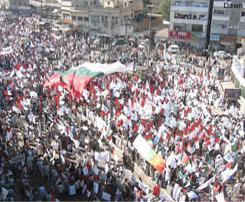5,000 Protest in Karachi
“That was worse than a crime; it was a mistake.”
–Talleyrand on Napoleon’s execution of the Duc D’Enghien
Dawn reports that 5000 protesters rallied in the Pakistani port city of Karachi on Sunday to protest the US missile strike that killed 18 Pakistani villagers (including women and children) in a failed attempt to kill al-Qaeda’s second in command, Ayman al-Zawahiri.

The crowds carried anti-American placards and chanted anti-US slogans.
Although demonstrations were held in some other cities, they were very small, only a few hundred in each case, in the Punjab, according to Dawn. Most Punjabis in places like Lahore don’t have the time of day for al-Qaeda or its supporters.
The Nation maintains that “thousands” demonstrated in the northern Pushtun (Pathan) city of Peshawar, but Dawn put the demonstration there at only 500. Dawn’s figure makes little sense, since the organizers of the protest control the Northwest Frontier Province, and if they could get out a fair crowd anywhere, it would be in their own capital. The photograph provided by the Frontier Mail, based in Peshawar, shows a bigger crowd than that.
The protest in Karachi was significant, but still small by the standards of that city (it has a population of some 9 million). Up to 80,000 protested the onset of the Afghanistan war in 2001, and 100,000 came out in spring of 2003 against the Iraq War.
The protest was called by the leader of the fundamentalist Jama’at-i Islami, Qazi Husain Ahmad, who also heads up a religious political coalition, the United Action Council. Even some rivals of that party, such as the secular MQM, threw their support behind the protest.
Within the context of Pakistani politics, the opposition is trying to use the missile strike to turn the population against Gen. Pervez Musharraf, who has worked closely with the Americans in attempting to destroy al-Qaeda and its allies in Pakistan and Afghanistan. He was condemned for continuing to rule as military dictator, despite the parliamentary elections of 2002. The religious parties, some of which have ties to the old Afghan Taliban, have about a fifth of the seats in parliament, and have allied with other opposition parties to virtually paralyze that body. The Jama’at-i Islami seldom got more than 2 or 3 percent in Pakistani elections, since most Pakistanis are not fundamentalists but rather traditionalists. Its popularity has been enhanced, especially among Pushtuns and in Karachi, by US interventions in the region since September 11, which are unpopular on nationalist grounds.
The Frontier Mail said that a member of the Pakistani parliament, Shabir Ahmed, addressed a crowd in Peshawar saying that the jihad against the United States must continue, and that just as the Soviet Union had been broken up into 12 countries as a result of its defeat in Afghanistan at the hands of jihadis, so the United States would be broken up into “52” separate countries. This is a member of the Pakistani parliament?
Protesters said that decisions should be taken in Islamabad rather than Washington.
It is impossible to tell how stable the situation in Pakistan is, or when an incident like this one will tip it over into substantial popular unrest. That uncertainty should inspire caution.
There are lots of things wrong with firing a missile at a private home at the time of the Feast of Sacrifice and killing 12 women and children. It was wrong, and was a form of state terror. But in addition, it was guaranteed to reinvigorate the Pakistani fundamentalists, who otherwise have not delivered politically for their constituents.
Can’t the US be more careful about this sort of thing? I mean, I’m all for getting Zawahiri, one of the most despicable mass serial killers in history. But we also have to win the war for hearts and minds, and this isn’t the way to do that.



 © 2025 All Rights Reserved
© 2025 All Rights Reserved